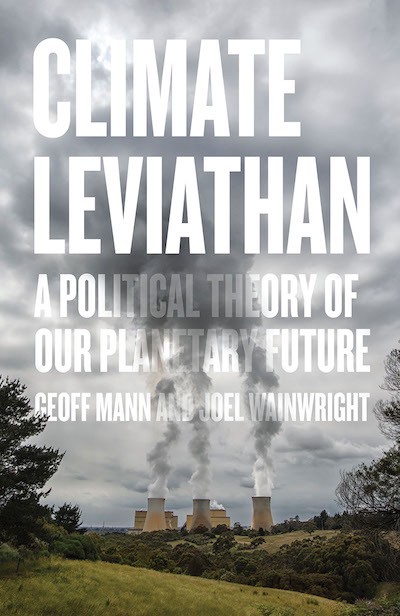As climate change worsens, the world’s most powerful states will become even more dominant through a concentration of political power, military force, and energy resources.

An excerpt from Climate Leviathan by Geoff Mann and Joel Wainright.
A rapid — and massive — change in the geographies of energy production and consumption is currently underway. In a bid for energy security and new streams of profits, some of the world’s largest consumers of energy are turning to “friendlier,” and, ideally, domestic suppliers. Big Oil’s gaze has turned north (to the Arctic), deeper (offshore), and dirtier (tar sands). While the Middle East still holds most of the world’s oil reserves, it accounts for only about a third of current global oil production.
Meanwhile, hydraulic fracturing, or “fracking,” has generated a massive push into “unconventional” hydrocarbon resources. Despite persistent talk of peak oil, the world is awash in fossil fuels. For the major energy corporations, demand is a bigger problem than supply.
These centripetal forces are reconfiguring the world’s political geography, spurring at least two profoundly significant developments. First, the “winners” of this geopolitical game, already the world’s most powerful states, are likely to become even more dominant through a concentration of political-economic power, military force, and energy resources. The United States and China have developed two of the largest fracking industries, and both have potentially enormous reserves of shale gas. Second, this shift signals the end of any hope for meaningful carbon mitigation. Fracking and related extractive processes are much more carbon-intensive than drilling Saudi oil, and the explosion in unconventional hydrocarbons guarantees increased greenhouse gas emissions.
Further still, the geographic and political-economic distribution of these resources deepens the global division of wealth and power, exacerbating geopolitical inequalities and further destabilizing what little ground international negotiations have cleared for cooperation on climate-related concerns.
The International Energy Agency does not say mitigation — in other words, drawing down carbon pollution to slow the buildup of CO2</sub in the atmosphere and thus slow the rate of climate change — is no longer possible. And, to be sure, some sectors, firms, and localities have reduced emissions. “Green energy” has expanded in many places — there are new solar panels in China and Europe, more dams on tropical rivers, and so on. Global demand for electricity has soared, and shows little sign of slowing. As of yet there is no green energy boom. But carbon emissions continue to accelerate. The International Energy Agency explains:
So, without radical change, the world’s atmospheric concentration of CO2</sub will not fall below 400 parts per million until after the Anthropocene. The possibility of rapid, global carbon mitigation as a climate change abatement strategy has therefore quite likely passed. The world’s elites, at least, appear to have abandoned it — if they ever took it seriously.
In 2010, the writer Mike Davis imagined a “not improbable scenario” in which mitigation “would be tacitly abandoned… in favor of accelerated investment in selective adaptation for Earth’s first-class passengers.”
His prediction may prove prescient.
Mike Davis
The goal would be the creation of green and gated oases of permanent affluence on an otherwise stricken planet,” he wrote. “Of course, there would still be treaties, carbon credits, famine relief, humanitarian acrobatics, and perhaps the full-scale conversion of some European cities and small countries to alternative energy. But worldwide adaptation to climate change, which presupposes trillions of dollars of investment in the urban and rural infrastructures of poor and medium-income countries, as well as the assisted migration of tens of millions of people from Africa and Asia, would necessarily command a revolution of almost mythic magnitude in the redistribution of income and power.What does the plausibility of such a terrible future scenario mean for politics today? The momentous socio-ecological transformations to which Davis refers — and against which a global climate justice movement might enact what he calls a “revolution of almost mythic magnitude” — is best grasped as a dangerous, conjunctural moment of transition in the planet’s natural history. In the midst of these changes the urgent questions concern not merely a transformation in politics, but a total transformation of the political.
We posit that two conditions will fundamentally shape the coming political-economic order. The first is whether the prevailing economic formation will remain capitalist or not: Will capitalism continue to shape social life in most places? The second condition is whether a coherent planetary sovereign will emerge — a body through which authoritarian rule-making may be carried out — and whether sovereignty will be reconstituted for the purposes of planetary management.
What we call “Climate Leviathan” exists to the extent that some sovereign — a body evolving out of the UN’s climate frameworks, perhaps — exists who can invoke the exception, declare an emergency, and decide who may emit carbon and who cannot. This sovereign must be planetary in a dual sense: capable of acting both at the planetary scale (since climate change is understood as a massive collective action problem) and in the name of planetary management for the sake of life on Earth. A task of biblical proportions, amounting to an impossible global accounting of everything, like determining “a weight for the wind and apportion[ing] the waters by measure,” to quote the book of Job.
limate Leviathan is defined by this dream of a planetary sovereign. It’s a regulatory authority armed with democratic legitimacy, binding technical authority on scientific issues, and a panopticonlike capacity to monitor the vital granular elements of our emerging world: fresh water, carbon emissions, climate refugees, and so on.
Though they failed to reduce global carbon emissions, the annual meetings of the United Nations Conference of the Parties (COP) to advance the United Nations Framework Convention on Climate Change (UNFCCC) represent the first institutional manifestation of this dream of planetary regulation — a process that the dominant nation-states will consolidate as climate-induced disruptions of accumulation and political stability become more urgent.
And the 2015 Paris Agreement clarifies the present conditions of any possible global agreement. To begin, capitalism is treated not as a question, but as the solution to climate change. Indeed, filtered through the COP lens, climate change appears to capital as an opportunity: trade in emissions permits (“cap-and-trade”), “green” business, nuclear power, corporate leadership, carbon capture and storage, green finance, and ultimately, geoengineering: these are Leviathan’s lifeblood. Why call this “Leviathan”? Climate Leviathan is a direct descendant from Hobbes’ original: when it comes to climate, Leviathan will decide, and, in fact, is constituted precisely in the act of decision.
It expresses a desire for, and the recognition of, the necessity of a planetary sovereign to seize command, declare an emergency, and bring order to the Earth — all in the name of saving life. If “the declaration of the state of exception has gradually been replaced by an unprecedented generalization of the paradigm of security as the normal technique of government,” then the consolidation of Climate Leviathan represents the rescaling of the “normal technique[s]” to encompass planetary security, or the making-secure of planetary life.
With this achievement, the state of nature and the nature of the state would form a self-authorizing union.
To date, what political scientists call “the interstate system’”— the networks and institutions through which capitalist nation-states negotiate agreements — has clearly failed to rapidly reduce carbon emissions. Yet the demands for action on climate change continues to grow This contradiction — rending deep fissures in the UNFCCC process — may lead, as with other “public good” collective action problems, to the construction of a nominally “global” frame that is in fact a political and geographical extension of the rule of the extant hegemonic bloc: the capitalist global North (working with its allies and, sometimes, China). But this is by no means certain. Any realizable planetary Climate Leviathan must be constructed with the approval of a range of actors formerly excluded from global governance — China and India most notably, but the list could go on.
Leviathan could take one of two broad forms. On one hand, a variety of authoritarian territorial sovereignty could emerge in nations or regions where political-economic conditions prove amenable to transcending capital. On the other hand, we could see Leviathan emerge as the means by which to perpetuate the rule of northern liberal, democratic capitalist states.
We think the most likely scenario is that, through the coming decades, the waning, U.S.-led, liberal capitalist bloc will collaborate with China to create a planetary regime that, in light of political and ecological crisis, will brook no opposition in defense of a human future for which it volunteers itself as the first and last line of defense.
The pattern of mobilization will likely be familiar, in which the United Nations or other international fora serve as a means of legitimizing aggressive means of surveillance and discipline. This could make the construction of Climate Leviathan a key means by which to salvage U.S. hegemony — a prospect that only increases the likelihood of its consolidation.
Climate Leviathan will be the fundamental regulatory ideal motivating elites in the near future. Still, it is neither inevitable nor invincible; it is strong and coherent but not uncontested. It is threatened from within by the usual burdens of any state-capitalist project divided by multiple accumulation strategies, and it is almost impossible to imagine that it will actually reverse climate change.




